| |
|
|
|
|
| |
An International Flashpoint |
|
|
|
| |
|
|
|
|
| |
Abuse of Aboriginal Title & Rights |
|
Wilderness: Awe vs Annihilation |
|
| |
Corrupt Politics: the Downward Spiral |
|
The Struggle of Environmentalism |
|
| |
Corporate Greed: Stump to Dump |
|
A Brave Stand: Betty! |
|
| |
|
|
|
|
| |
|
|
| |
Corrupt Politics: Race to the Bottom
The wholesale commercial ruination of the old growth forest resources of British Columbia (BC) over the past half century has been facilitated by collusion between the forest industry and corrupt government officials. Now that the lucrative big trees are mostly gone, the logging companies have merged into a few international consortiums at the cost of local communities whose future depends on sustainable forestry. Instead politicians promote clearcutting and the massive export of raw logs to the USA and China.
the ways in which trees became commodified, bureaucratized, and
even conscripted into the republican agenda.
"No industry has had greater influence on society's understanding of nature than the forest products industry, which, by reshaping the concept of 'forest,' distorts understanding of the larger natural world itself.This industry fosters educational programs that, by down playing identification with wild nature, by emphasizing the utilitarian, and by training the public to accept relatively biologically sterile plantations as 'forests,' erode society’s respect for the splendor of unmanaged nature and for its right to exist.The apparent aim is to extinguish the awe for the opulence of wildness that comes so naturally to the young and to replace it with a commodity – oriented value system. As is invariably the case for projects created, funded and marketed by a profit driven industry, the aim is not the public interest but the industry’s bottom line." |
|
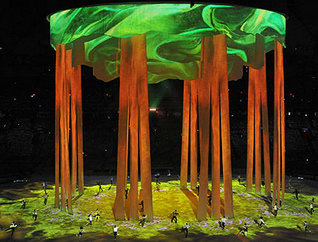
Big tree theme at the Opening Ceremony
Winter Olympics, Vancouver, 2010
|
|
| |
|
|
|
|
| |
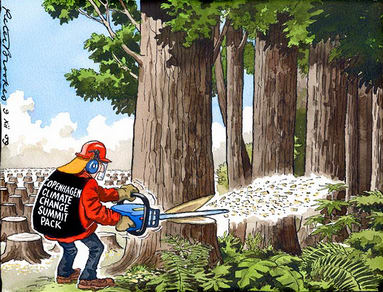
mmm
mmmm Crooked cronies are prevalent in colonial societies. They are unscrupulous figures in government and industry who use their leadership positions for personal gain, exchanging favours in making quasi legal fortunes from land grabs and resource extraction. Their eradication of the ancient trees and primaeval forests is to the detriment of First Nations and, ultimately, of all inhabitants of British Columbia. At the top of the long list of colonial oppressors is Trutch, a racist and a crook who committed untold damage to First Nations by stealing over 90 percent of the land deeded them by the first governor of the colony. Indigenous land owners in BC have never been recognized by the forest industry which plots with its government cronies, greasing all hands but those of most Natives |
|
The process of enclosure or creeping privatization of BC's public forests has not been identified as a problem. Its symptoms have surfaced from time to time as "war in the woods" in the form of episodes of civil disobedience and First Nation's claims.
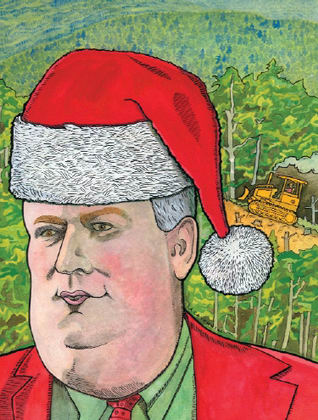
mm
m |
|
| |
|
|
|
|
| |
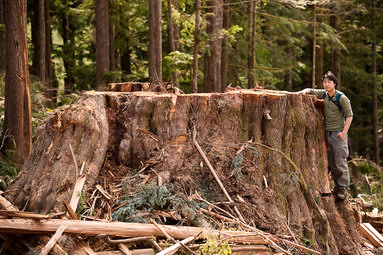
mmm
mmmm |
|
Gallery of Shame
With the industrial extermination of the lucrative intact forests of Washington State, "Hoo Hoos" (a club for American lumbermen founded in Seattle in 1909) began buying up Vancouver Island.
By the 1950s the industrial plundering of BC's forests was consolidated in "Ruination Companies," namely transnational forest destruction corporations which call the shots and are eagerly served by their government handmaidens. To keep their dirty business hidden from public scrutiny and critique, the devious ruination companies routinely "re-brand" and change their names. Spewing Greenwash and stock market hype, they continue their wanton destruction of our vanishing forests and biodiversity.One does not have to go far in BC to see the results of the many decades of deforestation schemes by government and industry. Greenwash cannot hide the tragic loss of the ancient temperate rainforest due to commercial greed run rampant and shortsightedness.
|
|
| |
|
|
|
|
| |
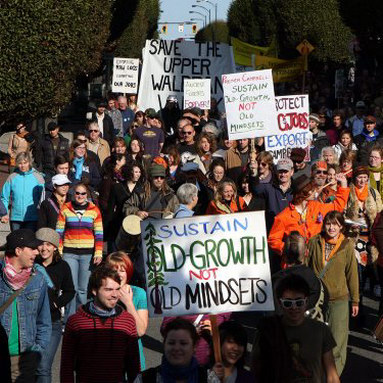
"Rally for Ancient Forests," 25 October 2008
Photo: Adrian Lam/Times Colonist
protesters walk up Government Street towards the BC Legislature as, the Western Canada Wilderness Committee held a ñRally for Ancient Forests and BC Jobsî, calling on Premier Gordon Campbell and the BC Liberal government to take action on the issue of old growth logging and how it's done, in Victoria, BC on Saturday, October 25, 2008.(Photo by ADRIAN LAM/ TIMES COLONIST) For City story by Judith LavoieAnd now just by an order in cabinet (laws put in place by Campbell) the provincial government has the power to take public lands out of Tree Farm Licenses, make them private, clear cut, export the raw logs and then sell the land to developers, minus consent of First Nations, or the rest of us, or even the legislature.Gordon Campbell has lied and bribed. But there are corrupt politicians all over the world and Campbell is unusual only in one aspect: He has maneuvered to bring all of the natural resources of this province under one big controlling umbrella without even the knowledge, much less the consent, of his own cabinet. |
|
The premier of BC provided a high praise blurb to the 2008 book by James Gustave Speth, professor of the School of Forestry and Environmental Studies at Yale University: "The Bridge at the Edge of the World: Capitalism, the Environment, and Crossing from Crisis to Sustainability." See: Praise. While the BC premier uses the occasion to urge a changing of "mindsets" to "restore the environment," his actions show the opposite. In protest, a rally of almost 3,000 people took place in front of the BC Legislature on 25 October 2008 (right). Citizens have been calling for an end to ancient forest destruction for decades but to no avail.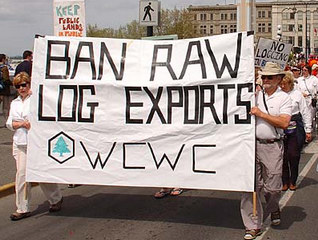
"Ban Raw Log Exports," Victoria, 2004
Photo: Jeremy Williams
|
|
|
|
|
| |
|
|
| |
|
|
|
|
| |
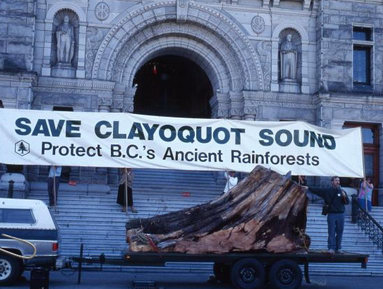
mmm
mmmm |
|
Chief Robert Morales, 2006. Ring Around the Legislature RallyFrequent protests are held such as the rally organized by the Western Canada Wilderness Committee (WCWC) in 2004 (right). Unions, labour federations and environmental groups have demanded new policies to preserve BC's old growth forests and protect jobs in forest dependent communities.
|
|
| |
|
|
| |
Vancouver Island is a scandalous showcase of how entire communities have been sold out by collaborative greed between government and big business. Clearcutting and overcutting the native forests has led to disaster. Chief Robert Morales has seen in his lifetime the complete deforestation of Cowichan Valley, once home to some of the world's biggest trees.
On 23 September 2006, the Wilderness Committee organized a "Rally for Vancouver Island's Ancient Forests and for BC Jobs." Speakers included Chief Robert Morales (right) of the Hul'qumi'num Treaty Group. He is calling for co management of the resources which the Cowichan Nation had sustainably stewarded for millenia prior to colonisation. |
|
|
|
| |
|
|
|
|
| |
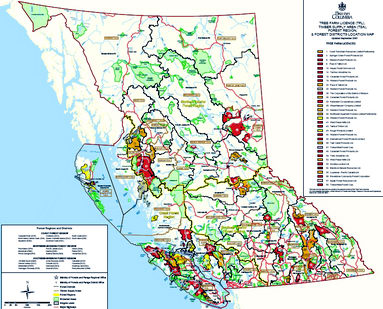
extraction must be expedited Right: Hoo Hoo members in front of the Forestry Building during its construction in 1909. Hoo Hoos were originally called the Fraternal Order of Lumbermen, an international organization of men engaged in the lumber trade who planned and financed the Forestry Building in Seattle to promote the wood products industry. Many visitors to the Exposition were Hoo Hoo members and to serve them, an exclusively male clubhouse, the Hoo Hoo House, was designed and built next to the Forestry Building.
Above: Forestry Building, 1909 Alaska Yukon Pacific Exposition, Seattle, Washington State. Offical postcard. Left: Colonnade of monumental Douglas firs, Forestry Building. Intended to awe visitors by its dramatic size, the Forestry Building's colonnade of firs was designed in the Grecian temple style with marble columns like the White House and US Capitol in Washington DC. Demand the policies that would facilitate the change you want. Demand they stop the pipe. Demand they restore BC as the best place on Earth. Demand they charge the criminals who liquidated our assets. Demand they regain the destiny of our crown jewels such as BC Hydro.
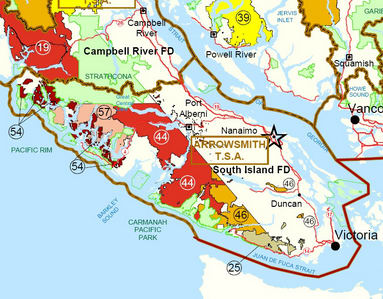
m
m |
|
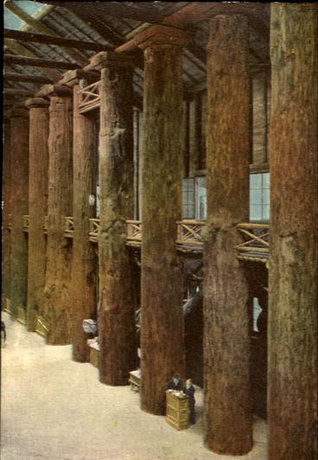
mmm
mmmm

Every coastal community is alarmed at the potential for the transition of current private managed forest lands to real estate development – a huge structural aspect of forest ‘redevelopment’ that has been completely overlooked by this report. Should this occur, massive tracts – in the tens of thousands of hectares - would be lost to productive forestry. In fact, it is the stated intentions of two of the major private land holders on the Island and on the lower coast of the province - Island Timberlands and TimberWest (TW) Forest Corporation - to move away from ‘traditional’ forestry towards a theoretical “highest and best” designation of their lands. Both companies have evolved corporate facades and TW has created an actual real estate arm; in the case of Island Timberlands – Bermuda based Brookfield Asset Management - and TimberWest, the largest private land owner in western Canada, has created Couverdon. While local governments have, by and large (and ostensibly with the support of the courts), the zoning tools to protect these lands as forest lands, apprehension exists that the provincial government could overrule local government land use regulations and invoke legislation similar to Bill 30 and/or Bill 75. To assist local governments, an opportunity exists with the provincial government to re-establish the forest land use designation to provide certainty, or put forest lands into the Agricultural Land Reserve (ALR).
Private Forest Lands (PFLs) taxation is also at a disadvantage when compared to properties in the ALR. PFLs are hit with a tax when the timber is harvested; a farmer who harvests timber on his/her property is not. This playing field should be levelled. The continuing practice of log exports – particularly from private managed forest lands – remains problematic for those communities who continue to seek lost appertency benefits – not necessarily as was formerly, and formally, tied to forest tenures such as TLs or TFLs - but rather via simple forest worker employment that could be created by engaging local workers and contractors to conduct the complete harvesting cycle – from cruising to regeneration. By importing “stump to dump” contractors that may come from any place in the province (or under TILMA - out of province) - generally at the lowest cost possible - forest companies may well be maximising their attempts at generating profits at the expense of the general well being of the communities we all serve and in which they operate. This could result in a traditional “race to the bottom” campaign with all parties ultimately failing. In addition, the removal of the fibre from the provincial supply chain through export – particularly to the U.S. – creates an unfair trade advantage for the U.S. lumber industry and a complete loss of the fibre for our own pulp and paper sector, already in desperate financial chaos. |
|
| |
|
|
 |
|
| |

"One Log" Logging truck with 500-600 year old tree, Nanaimo, Vancouver Island, 5 January 2011.
Photo: Karen Wonders

Raw log export. Graveyard of ancient big trees, 500-600 years old, Duke Point Log Sort, Nanaimo, 5 January 2011.
Photo: Karen Wonders |
|
| |
|
|
|
|
| |
Minister Bell is a joke. 'Surgical','tweaking the system' read as, we will do the absolute minimum in order to quieten the rebellious masses calling for us to actually stop pillaging the forests of BC. A complete ban on old growth forest trashing is what is needed and all this character can offer is local protection for a few of the 500 year old trees. Nothing short of a rebellion like Egypt will stop these 'democratic dictators' bent on the destruction of the natural
heritage of this province.
As industrial forestry dominates Vancouver Island,
the protective function of the old forest cover disappears and the pockets
of old growth, including groves of ancient trees, are left exposed to hurricane
force winds. |
|
| British
Columbia is over run by proponents of clearcutting and industrial tree
farms.
Tree vandal and BC Forest Minister Pat Bell (right) must stop his double-talk and begin a process to make big tree cutting and ancient forest destruction a felony .
|
 |
|
|
| |
|
|
|
|
| |
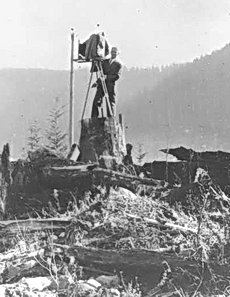 |
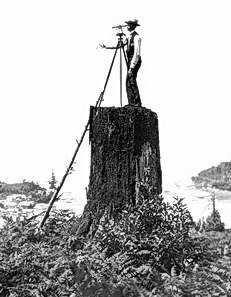 |
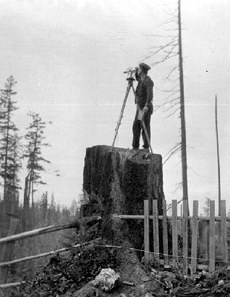 |
Self-portrait, Washington, c. 1900
Photo by Clark Kinsey |
Surveyor at work at Fort Lawton, 1900
Photo by H. Ambrose Kiehl |
Surveyor at Mill Bay, 1901
Photo by Frank Swannell |
|
|
| |
|
|
|
|
| |
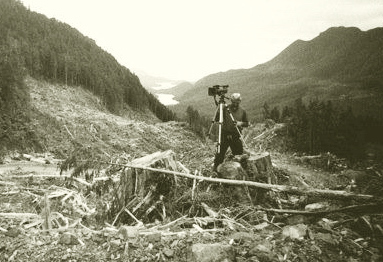
mmmmmm
mmmmmm |
|
Canada's blatant endorsement of the destruction
of the last stands of BC's vanishing giant trees is like Japan's defence
of blue whale killing as scientific or South Africa's promotion of trophy
hunting by using a rhino corpse. It is shocking that Canada – supposedly a leading western nation – openly
condones ancient forest extermination.
Save the Klaskish Giant and East Creek |
|
| |
|
|
|
|
| |
|
|
|
|
| |
|
|
|
|
| |
Big Trees as Commercial Products At one time there seemed to be an endless supply of old growth trees in BC for the forest industry to consume as wood, pulp and paper, fuel and other commercial products. Today these valuable trees are a disappearing commodity and require urgent protection if they are not to become extinct. Yet the forest industry continues to blatantly advertise its unethical wares. A typical website photo (right) shows the owner of a Vancouver Island lumber company standing proudly beside his old growth Douglas fir stock. BC's last intact forests are being destroyed to supply industrial markets in the US, China and Europe. The icon big trees are "logged and flogged" while the forests are converted to industrial tree farms and/or "stripped and flipped" for development. |
|

Old growth Douglas fir lumber ad.
Island Timberframes website (20 Feb. 2011) |
|
| |
|
|
|
|
| |
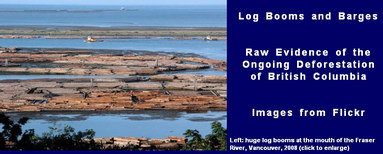
Log Booms and Barges mm
mmmmmmmmmmmmmmmmmmmm Vandalized, clearcut forest habitat near the Fraser River,
British Columbia, Canada.
Industrial resource extraction corporations ruin biodiversity and abuse Indigenous
Title and Rights everywhere in the world. Also in supposedly "developed" countries such as Canada
Public Private Partnerships, the consolidation of all our natural resources into one package that can be sold, given over, traded, or simply sucked dry.
|
|
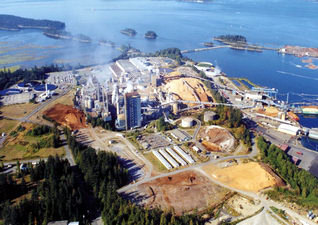
Catalyst Paper and Pulp Mill, Crofton, 2010.
Vancouver Island, British Columbia
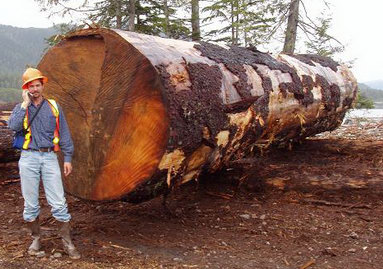
Transpac.
mmmmmm |
|
| |
|
|
|
|
| |
|
|
| |
|
|
|
|
| |
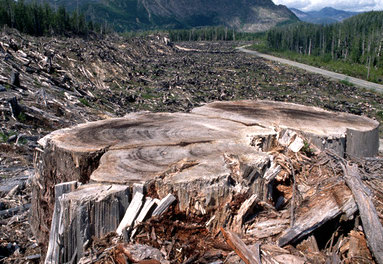
Sacred Grove.
mmmmmm |
|
Big trees brochure cover, 2009 World Forestry Congress
Sponsored by the United Nations (red text added)
Congress delegate Avrim Lazar, president
Forest Products Association of Canada
At the United Nations sponsored 2009 World Forestry Congress in Buenos Aires, Argentina, tree vandals joined forces against ancient forests and Indigenous Rights. Muli-national bigwigs and their corporate/ government minions callthe shots while looting the forests and stealing from First Nations: Avrim Lazar
false advertising should be
Ancient Forest Extermination Avrim Lazar is President & CEO of the Forest Products Association of Canada, since Jan. 1, 2002. In July 1998, Avrim Lazar was appointed Assistant Deputy Minister, Strategic Policy, Human Resources Development Canada. From 1995 to 1998, Mr. Lazar served as Assistant Deputy Minister, Policy and Communications, Environment Canada. Mr. Lazar began his public service career in 1978 as a Senior Analyst, with the Department of Justice. He remained with that Department as Chief, Policy Research, Civil Law and Social Matters (1981-82) and then as Director, Programme Evaluation (1982-85). In 1985, he was appointed Director General, Review Directorate for the Public Service Commission (PSC) of Canada. He joined Agriculture Canada in 1991 as Director General, Bureau of Environmental Sustainability, and later became Director General, Policy Coordination and Strategic Directions, Policy Branch (1992-94). In 1994, Mr. Lazar was appointed Director General, Biodiversity Directorate and Conservation Policy and Planning, Environment Conservation Service, Environment Canada. "We are at the dawn of a new era for forestry" 22 October 2009
Buenos Aires, Argentina - “Work is under way to prepare for a new future as we are at the dawn of a new era for forestry”, the XIII World Forestry Congress was told on Wednesday by Tim Rollinson, Director General of the UK Forestry Commission, who chaired the Special Forum on Forests and Climate Change.
|
|
| |
|
|
|
|
| |
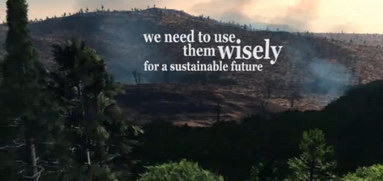 |
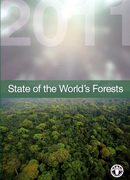 |
Left: 2011 United Nations Report: "State of the World's Forests"
Canada is not included in the report because in Canada the global forest industry cuts its own path of destruction, using the"sustainable" cliché to greenwash its shameful profiteering |
|
|
| |
|
|
|
|
| |
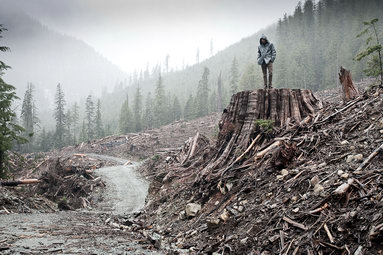
Sacred Grove.
mmmmmm |
|
The destruction of BC's last surviving intact ancient forest habitats and primeaval trees for commercial products is an abuse of Indigenous Rights and a case for international condemnation of Canada, a country whose oppressive colonial history continues unabated in the form of natural resource exploitation. |
|
| |
|
|
|
|
| |
|
Right: Model of 80,000 Shanghai housing units made of BC wood
BC Forestry Trade Commission to China, 2010 (red text added) |
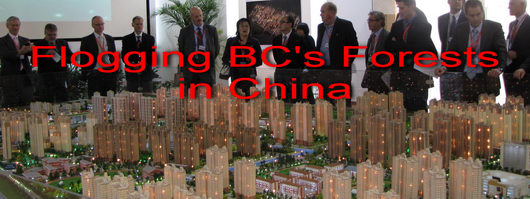 |
|
|
| |
|
|
|
|
| |
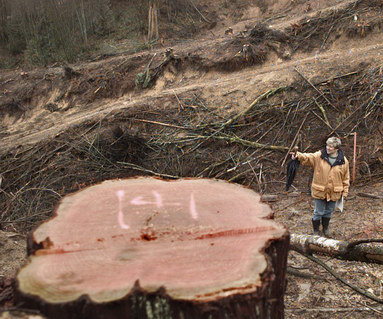
Sacred Grove.
mmmmmm |
|
Corrupt Politics: Race to the Bottom mmmm The largest-ever B.C. forestry trade mission will be in China from Oct. 28 to Nov. 8 to increase lumber sales and strengthen industry-to-industry commercial relationships. Shanghai Scale Model Minister Bell and the forestry trade mission are briefed on how wood frame construction will be used in the Sanlin township development in front of the scale model of the development
|
|
| |
|
|
|
|
| |
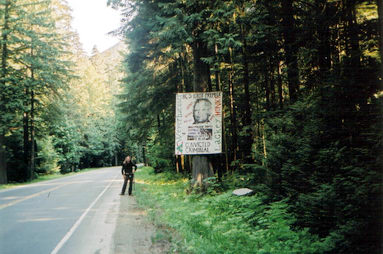
mmm
mmmm
|
|
|
|
| |
|
|
|
|
| |
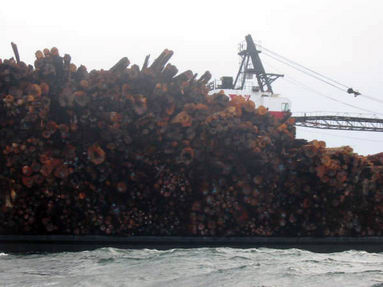
Industrial log barge off BC coast.
Photo: anon
"There is an immediate need to stop this degradation and revisit destructive decisions and processes. Meanwhile, logging is unabated and escalating in areas of the coast such as Nootka Island (where they are even logging the beaches), Kyuquot, Port Alberni and elsewhere. As this log barge was leaving Clayoquot Sound, another larger empty one was passing nearby heading Northwards" Steve Lawson, First Nations Environmental Network. |
|
mmmmmmmmmmmmmm
mmmmmm |
|
| |
|
|
|
|
| |
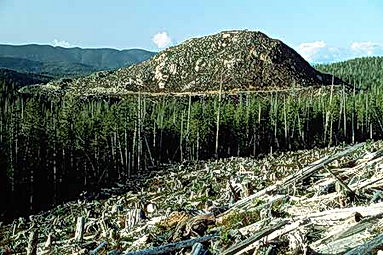
Walbran Carmanah clearcut, c. 1980.
Photo: Philipp Kuechler
By chance, Bonnie Hayward happened to have a camera on 5 April 2006 when a logging truck carrying an enormous Douglas fir log went by (above). The healthy matriarch tree is believed to have been logged by Hayes Forestry Service, a subcontractor for Teal Jones. "It is not just the quantity of trucks pouring out of the Cowichan Valley that is galling (953 documented over 4 days recently), but the quality and age of timber that is seen on the backs of some trucks. In recent months there have been numerous sightings of single logs like this one that literally fill the logging truck bunks" Roger Wiles: Youbou TimberLess Society.believes that the huge fir log comes from the Upper Walbran, close to the unprotected record breaking fir named "Big Betty"in honour of Betty Krawzyck who was arrested in 2003. |
|
At the core of BC's forestry crisis is the need to resolve the legal issue of Aboriginal Title and address the economic interests of local communities including First Nations. Sustainable grassroots alternatives to industrial forestry exist but the political will to provide protective legislation against the powerful multinational forest industry is absent in BC. Enormous efforts are put into greenwash public relations rhetoric, yet no real efforts at changing the status quo have been made and the profits from old growth logging continue to flow out of the local communities to the far away big city based corporations and their stakeholders.
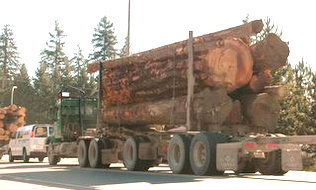
Ancient fir tree, Cowichan Lake, 5 April 2006
Photo: Bonnie Hayward |
|
| |
|
|
|
|
| |
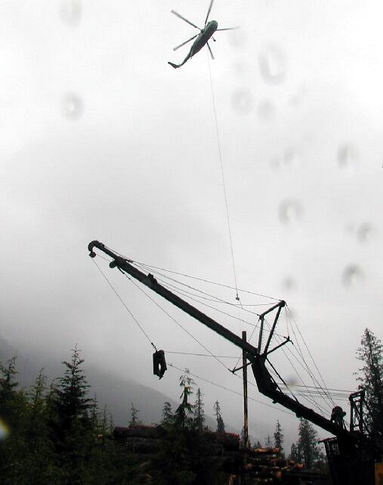
Heli logging, Weyerhaeuser log dump, Walbran, 2005
Photo: Richard Boyce |
|
Clearcutting: Yesterday & Today
Photo: AKU
A cartoon on the German environmental website Naturschatz ridicules the BC forest industry's definition of sustainable logging, greenwash nonsense called "variable retention" (above). Another deceitful coverup in BC are the "Special Management Zones" where a few trees are left standing (below). Today the valuable old growth trees are so rare that they are targeted and logged using helicopters (left). See a history of clearcutting: Evolution der Kahlschlag in BC. |
|
| |
|
|
 |
|
| |
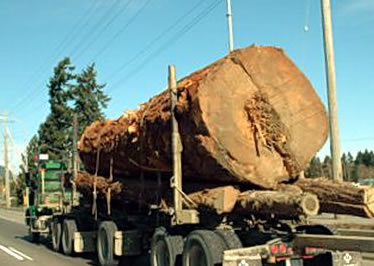 |
|
|
Right: Instead of being vilified for his criminal acts of nature destruction, the owner of Hayes Forest Services sits on the Royal BC Museum board of directors (2008)
Left: Logging truck with ancient fir tree killed by Hayes Forest Services. This snap shot was taken on 5 April 2006 by Bonnie Hayward of the Youbou TimberLess Society |
 |
|
|
| |
|
|
 |
|
| |
TimberWest is the largest holder of private forest lands in BC, including the Cowichan and Alberni Valleys. See a 2006 photo gallery of forest degradation: TimberWest Logging (WCWC). How are these corporations able to continue to exterminate the last of BC's big tree icons and ancient forests? According to Roger Wiles (left), a former TimberWest employee and a founder of Youbou TimberLess Society: "By an assortment of flawed policies, governments and forest companies have conspired to redesign the forest resource sector in such a way as to threaten the survival of jobs, families, communities,
watersheds and ancient forests."
"BC Ministry Of Forests mandarins, forest industry lobbyists, hat in hand consultants, labour leaders and forest company executives have guided and cajoled public forest policy to the advantage of big business and their global agenda. The needs of resource communities have been ignored and neglected by privatizers and opportunists."
"Our ancient temperate forests are at serious risk of extinguishment. There is no logical reason that they cannot be protected by a permanent moratorium. . . There is no reason why market based management of public forestlands cannot be conducted by and for communities and First Nations. There is no good reason for the public interest to be subordinate to private interests . . " Roger Wiles
Hinterland Views on Ancient Forests (2006). |
|
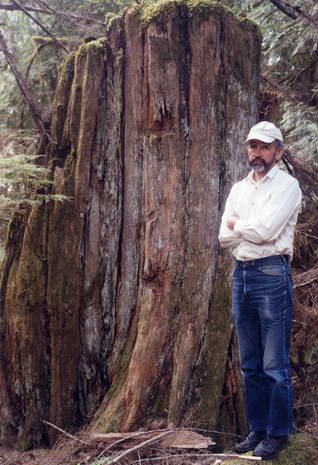
Roger Wiles, Lake Cowichan, 7 May 2006
Photo: Karen Wonders |
|
| |
|
|
|
|
| |
mmmmmmmmmmmmmm
mmmmmm |
|
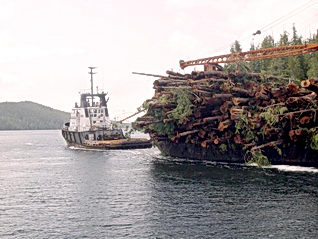
Log barge, Vancouver Island, 2004
Photo: Ray Morgan |
|
| |
|
|
 |
|
| |
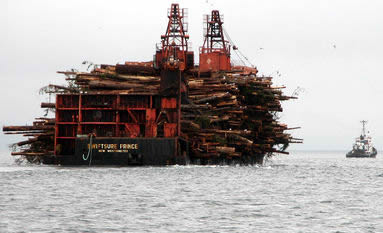
Barge with old growth logs leaving BC
Photo: anon |
|
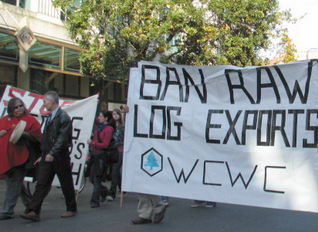
mmmmmmmmmmmmmm
mmmmmm |
|
| |
|
|
|
|
| |
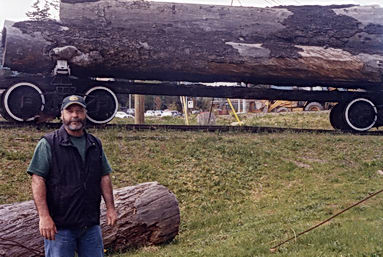
Ken James, Youbou TimberLess Society, 2007
Photo: Karen Wonders
When TimberWest closed its Cowichan Lumber Mill in the small town of Youbou on Lake Cowichan in 2001, a group of ex sawmill workers formed the Youbou TimberLess Society with a mandate "to educate the larger community to the wrongs being perpetrated on communities by multi national corporations in the name of profit." The Society regularly holds counts of the number of logging trucks with raw logs, most with prime old growth, that are leaving the Cowichan Valley (right). |
|
Historically the right to log on public land in BC required companies to process the wood in the local communities and cut the forests at a sustainable rate that guaranteed employment over a long period of time. During the past few years, however, the BC government has deregulated the forest industry with dire consequences for both nature and local communities such as Youbou. "Forestry workers, First Nations and environmentalists all share the same problem of massive raw log exports" says Ken James (left).
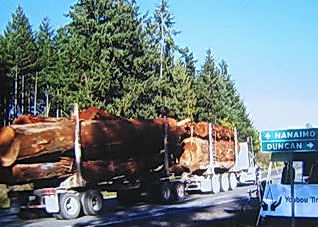
"Raw Log Truck Count"
Youbou TimberLess Society |
|
| |
|
|
|
|
| |
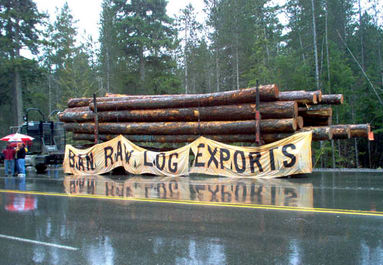
Ban Raw Log Exports Protest, Port Alberni
Save Our Valley Alliance, 3 May 2006
Port Alberni forestry workers, environmentalists, unionists, water users and other community members have called for a ban on raw log exports: "Ships are taking these logs to Asia while our own mills lack a secure supply. This a direct result of BC Government actions that have taken our wealth and given it to Island Timberlands. It is a clear case of failure to govern in the public interest" Save Our Valley Alliance.
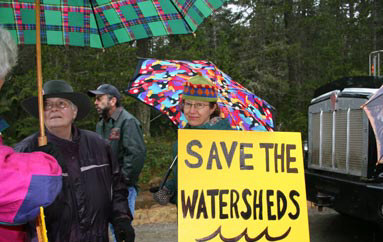
mmmmmmmmmmmmmm
mmmmmm |
|
According to Youbou TimberLess Society member Roger Wiles, "The cunningly divisive campaigns by forest companies have pitted workers and communities against environmentalists. They have concocted and coordinated a poisonous and bogus 'jobs versus environment' debate, polarizing the issue and capitalizing on the resultant discord. This is more than a case of divide and conquer; it is divide and deregulate"
Hinterland View on Ancient Forests.
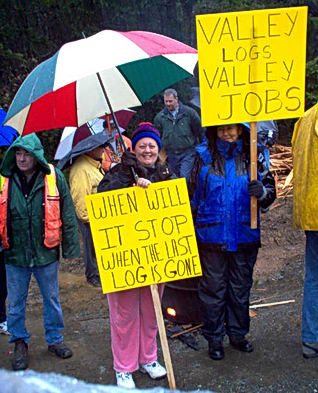
Logging protest, 3 May 2006
Photo: Save Our Valley Alliance
They are demanding that TimberWest stop its destructive logging practices in the Beaufort Range and that the BC government reverse the recent decision to deregulate private forest lands. Road blockades (above and right) and "Raw Log Truck Counts" with the Youbou TimberLess Society to bring public attention to the problem of massive raw log exports, disappearing forestry jobs and dying communities. |
|
| |
|
|
|
|
| |

Port Alberni Blockade, 7 March 2005
Photo: Phil Carson
On 7 March 2006 in the pouring rain, an angry community protest took place west of Cathedral Grove on the Port Alberni Highway. Environmentalists, loggers and mill workers together formed a blockade to stop logging trucks departing from Port Alberni as a protest against the soaring rate of raw log exports. The protesters demanded an end to the clearcut logging of their drinking watershed by the rape and run TimberWest, a logging company that operates with no concern over the health and long term economy of the community. Green Party leaders Paul George and Adriane Carr took part in the protest (right). |
|
Port Alberni Blockade, 7 March 2005
Photos: Phil Carson |
|
| |
|
|
|
|
| |
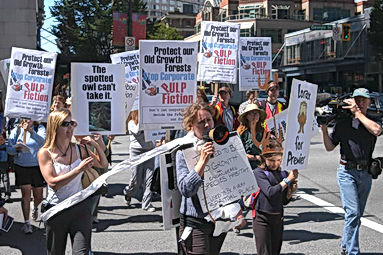
Protest at the Global Forest & Paper Summit, 2005
Photo: Caribou Nation
Protesters at the Global Forest and Paper Summit carried signs demanding: "Protect Our Old Growth Forests: Stop Corporate Pulp Fiction!"(above). Not content to convert old growth forests into tree plantations, the multi national corporations engage in profitable real estate speculation. See: Weyerhaeuser: the Real Estate Empire |
|
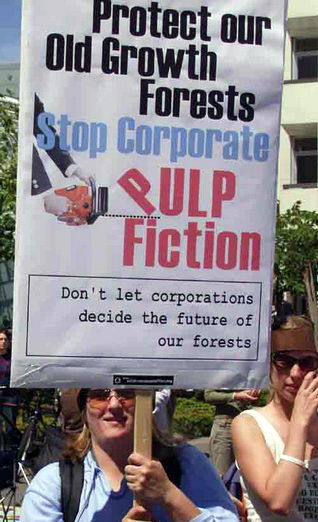
Protesters, Vancouver, 2005
Photo: Wilderness Committee |
|
| |
|
|
 |
|
| |
|
|
|
|
| |
|
|
|
|
| |
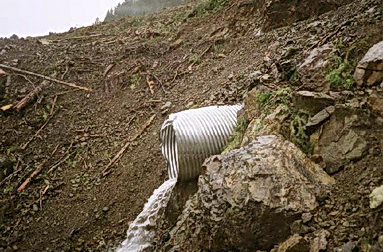
Salmon stream destroyed by TimberWest, 2005
Photo: TimberWest Forestry Ltd |
|
The Port Alberni paper mill was taken over by the Norwegian paper company Norske Skog in 2003, and in 2006 it was bought by Catalyst Paper Corporation. In the 150 years that the forest industry has operated in the Alberni Valley, it has caused massive deforestation and pollution by toxic air emissions and sludge.
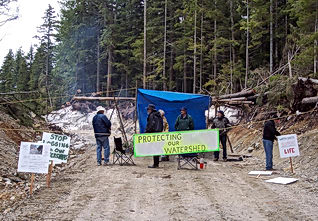
Protecting Our Watershed
Chapman Creek, 2007 |
|
| |
|
|
|
|
| |
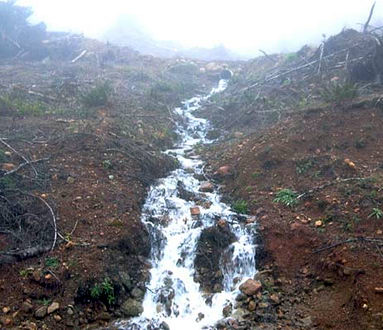
Cutblock by TimberWest, near Port Alberni, 2006
Photo: Wilderness Committee |
|
Tree Farm Licences are 25 year agreements which give companies wide powers to manage public lands in B.C., Canada. From the beginning, the TFL system has been at the heart of the contentious forest debate which has carved up the map of B.C into small fiefdoms with an ever-diminishing return to the public. Indeed, the first TFL, granted in 1956, resulted in the arrest of the only Minister of the Crown (Bob Sommers) to be ever convicted in the British Commonwealth. The renewal of these licences will further concentrate control of vast areas of public land into the hands of fewer multinational corporations. This will reduce future options for alternative forest management policies such as community or aboriginal management. The TFL's were originally created as a massive give away to their corporate supporters. Since then the TFL system has resulted in an even greater concentration of control in the hands of foreign multinationals. |
|
| |
|
|
|
|
| |
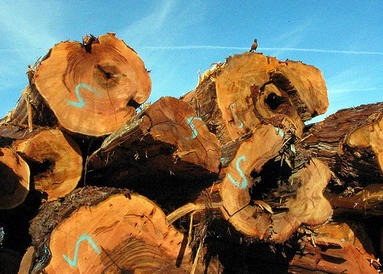
Old growth cedar logs, Port Alberni, 2007
Photo: Flickr
Today the community of Port Alberni is trying to establish itself as an eco tourism destination but the clearcutting of the last remnants of old growth forests continues, trashing salmon bearing streams and causing erosion in the watershed and contamination of the drinking water (left). Living big trees are worth far more to the nature tourism economy than dead ones exported to foreign markets as raw logs for wood products. |
|
Raw log exports, especially of valuable old growth trees (left) is a crisis that demands an immediate political solution. Keynote speeches at the protest rally (above) were given by a number of prominent activists including Hupacasath First Nation Chief Judith Sayers, Youbou TimberLess Society founder Ken James; and Friends of Clayoquot Sound forest campaigner Marjka Mychajlowycz. Over four hundred people joined hands and encircled the BC Legislative Building to call for protection of the surviving trees and to ban raw log exports.
Crimes Against Ancient Forests |
Click photos for galleries |
|
|
| |
|
|
|
|
| |

Temperate rainforest destroyed by MacMillan Bloedel into
a vast clearcut and industrial tree farm, c. 1990.
Nuu chah nulth Land, West Coast, Vancouver Island, British Columbia |
|
| |
|
|
|
|
| |
|
|
| |
©
Credits & Contact |
|
| |
|
|
|
|

